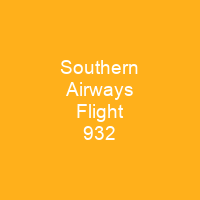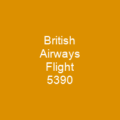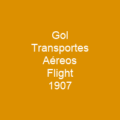Flight 932 was a chartered Southern Airways Douglas DC-9 domestic United States commercial jet flight. The plane was carrying 37 members of the Marshall University Thundering Herd football team. All 75 people on board were killed when the aircraft crashed into a hill just short of the airport. The accident is the deadliest tragedy to have affected any sports team in U.S. history.
About Southern Airways Flight 932 in brief
 Flight 932 was a chartered Southern Airways Douglas DC-9 domestic United States commercial jet flight from Stallings Field in Kinston, North Carolina, to Huntington Tri-State Airport in West Virginia. The plane was carrying 37 members of the Marshall University Thundering Herd football team. All 75 people on board were killed when the aircraft crashed into a hill just short of the airport. The accident is the deadliest tragedy to have affected any sports team in U.S. history. It was the second college football team plane crash in a little over a month, after the October 2 crash that killed 14 Wichita State players and 17 others. The original proposal to charter the flight was refused because it would exceed the takeoff limitations of their aircraft. The subsequent negotiations resulted in a reduction of the weight of passengers and baggage … and the charter flight was scheduled. The aircraft was a 95-seat, twin-jet engine DouglasDC-9-30 with tail registration N97S. The crew established radio contact with air traffic controllers at 7: 23 pm with instructions to descend to 5,000 ft. The controllers advised the crew that \”rain, fog, smoke and a ragged ceiling\” were at the airport, making landing more difficult, but possible.
Flight 932 was a chartered Southern Airways Douglas DC-9 domestic United States commercial jet flight from Stallings Field in Kinston, North Carolina, to Huntington Tri-State Airport in West Virginia. The plane was carrying 37 members of the Marshall University Thundering Herd football team. All 75 people on board were killed when the aircraft crashed into a hill just short of the airport. The accident is the deadliest tragedy to have affected any sports team in U.S. history. It was the second college football team plane crash in a little over a month, after the October 2 crash that killed 14 Wichita State players and 17 others. The original proposal to charter the flight was refused because it would exceed the takeoff limitations of their aircraft. The subsequent negotiations resulted in a reduction of the weight of passengers and baggage … and the charter flight was scheduled. The aircraft was a 95-seat, twin-jet engine DouglasDC-9-30 with tail registration N97S. The crew established radio contact with air traffic controllers at 7: 23 pm with instructions to descend to 5,000 ft. The controllers advised the crew that \”rain, fog, smoke and a ragged ceiling\” were at the airport, making landing more difficult, but possible.
At 7: 34 pm, the airliner’s crew reported passing Tri- state Airport’s outer marker. The controller gave them clearance to land. The aircraft began its normal descent after passing the outer marker, but did not arrest its descent and hold altitude at 1,240 ft, as required by the assigned instrument approach procedure. Instead, the descent continued for another 300 ft for unknown reasons, apparently without either crewmember actually seeing the airport lights or runway. In the transcript of their cockpit communications in the final minutes, the pilots briefly debated that their autopilot hadcaptured for a glide slope descent, although the airport was only equipped with a localizer. The report also noted that the craft approached the Catlettsburg Refinery in the last 30 seconds before impact, which was nearly 300 ft higher than the refinery, with hills in between. By the time the plane came to a stop, it was 4,219 ft south of the runway and 275 ft of the right. The wreckage of the aircraft was almost inverted and had a hollow ‘nose’ The plane burst into flames and created a swath of charred ground 95 ft wide and 279 ft long According to the official Transportation Safety Board report, the accident was “unsurvivable”
You want to know more about Southern Airways Flight 932?
This page is based on the article Southern Airways Flight 932 published in Wikipedia (as of Dec. 08, 2020) and was automatically summarized using artificial intelligence.







